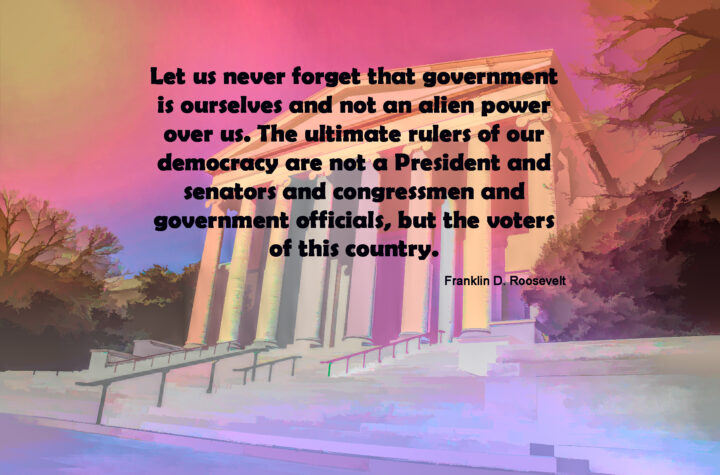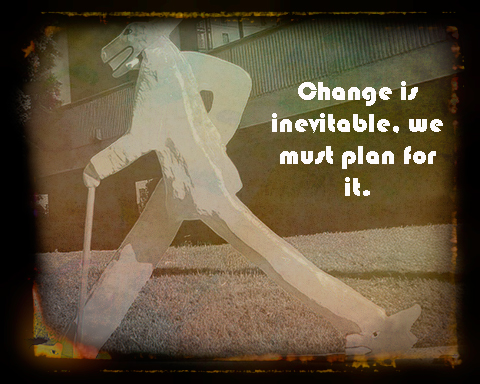
Posted on August 12, 2019 by SLVDemocrat
the last few days I was struggling with the relentless tide of bad news from the shootings in El Paso and Dayton. These events, together with Trump’s Response were taking a toll on my emotional well-being. Honestly it is difficult to remain motivated and stay in the fight for democracy and restoring the sanity of our social environment. The question here is how can I and you find that sweet spot between denial and despair?
My only intention then to put down the book American Carnage; it was getting depressing anyway. I switched gears and started reading an article published in The Island Press. It was an interview with Suzanne Moser, editor of the Island Press Urban Resilience Project a well-respected scientist who was involved in climate change issues.
What piqued my interest was Moser’s conversation about communicating bad climate news, the benefits of “functional denial,” the “varied flavors of hope”, and “the better world we can build in the wreckage of life as we know it.”
She was questioned about fear as a motivation to shock the American public into dealing with climate change. Unfortunately scaring the BeJesus out of people is not productive. It certainly hasn’t worked over the last several decades. While there is no doubt that fear is motivational, or else we would not be here as a species. But if you only scare people without giving them the means to transform that fear into taking protective or remedial action. Moser opines that There are two reactions we have to a threat: “we either deal with the threat, or we deal with the feeling about the threat.”
The first option leads to an attempt to reduce the threat. You can move away from the threat, relocate to a less impacted area or build levees seawalls and bulkheads to reduce it.
Or in the latter case we can practice avoidance. I am not going to face the issue directly because I don’t have any solutions and without viable solutions, I will simply stick my head into the sand.
“certainly plenty of us are scared. These days, if you’re not terrified, you’re not paying attention. So, how can we recognize the trouble we’re in and still get out of bed in the morning?”
Suzanne Moser,editor of the Island Press Urban Resilience Project
She recognizes we’re short-sighted human beings for the most part. However, history indicates that we can spend 300 years to build a cathedral and we’ve built more than one, so genetically it appears that we can focus beyond the next Facebook post email text or videogame.
As we get out of bed in the morning we really don’t know what the day will bring. It is the future and by getting up we start to shape our future minute by minute, day by day. It is an incremental task that needs a goal and objective regardless of the scale.
As I am writing this, I remember it’s time to go to another doctor. In my car, my thoughts turn to the need to confront the fact that this automobile and millions of others have put tons of CO2 in the atmosphere. Remaining optimistic I believe there is a solution, but it is not immediate solution. We’re dealing with a global system that’s highly interconnected. We have set so many things in motion that if you tried to control it right now, you couldn’t.
On the other hand, there is substantial space left in terms of what we can do. We can’t just do anything we want, because the social, financial and political inertia are obstacles on our critical path. That ship has sailed and is now in motion, it will not be turned quickly. Resolving air pollution will require tremendous amount of human energy which will challenge our entire species. Dealing with climate change requires first a radical acceptance of the facts that it is occurring. In my mind, we must simply stop making it worse. I believe are so many options to deal with a global challenge and to make life much less miserable for the vast majority of the world’s people.
“…it’s a matter of priorities and values, and reckoning with what we have done. In the public sphere, it’s called political work. In the private sphere, there is deeply personal transformational work that needs to be done.
Suzanne Moser,editor of the Island Press Urban Resilience Project
It is incredibly hard to look the reality of climate change in the eye. Regardless, most of us will make the choice to keep on going. There is that first step of getting out of bed and deciding to take on the day, even if it is crowded with mundane activities. At the foot of the bed you may contemplate or examine changes and choices to be made that will not contribute to the problem. Or maybe it’s time to get moving and deal with your life. Deep thoughts require that first cup and then drop back of coffee.
Maybe at that same time, every single day, I must face what the real world is. I might ask myself – “How does that make me feel.” It may be on your partner’s mind as well. At the bottom that cup of coffee you confront your anger and grief about what we as humans had the audacity to create either for our own greed or need with no thought to the unintended consequences of convenient choices. Such thoughts can paralyze you.
In the process of life, we must multitask, simultaneously being aware and conscious of global mistakes and issues; accepting the gravity of the real world. But those thoughts must coexist with your daily obligations whether to family or employer
As a city planner, I constantly had to deal with implementing change. The city was undergoing substantial change from a variety of sources. As I worked with the city to develop a strategy for managing that growth effectively. That plan included a core value of “change is inevitable, we must plan for it.” So how do you implement change? I believe in the premise that there are three elements that are needed to achieve change. They are Consensus, crisis and leadership. We can all agree that change is required and unite to solve the problem. On the other hand, we react to a crisis because there is no other choice it must be dealt with. The critical element of the three is leadership (sound familiar?)
At present, we do not have authentic leadership. Donald Trump and other radical right-wingers make promises of certainty. They shout “America is going to be great again, (it’s going to be purely white), and we’re going to have great economy and we’re the best.” All too many of us believe in that certainty, regardless of the cost to our social, moral and economic fabric.
An authentic leader may address the public differently, “The future is going to look very different, and I can’t tell you how, but we’re going to have to go through that together and figure it out and create it.” We must deal with that uncertainty; it will require hard work. It’s an unpopular statement. Doesn’t make for a very good talking point while running for office.
I believe this is the kind of framing that we need, and the kind of leadership that we need, to help us understand that this is a process. It’s a very archetypal process. Maybe we’ve never been at this much risk, as a species, but it’s not like we have never had to go through anything similar. Change at the global level infers that there will be loss: loss of the familiar, of places we love, of the stable climate that gave us a huge boost as a species.
Maybe the era of migration from Europe to North America is a good example. You must let go of your homeland, and you set off on a ship in the ocean. You don’t know whether the boat is going to hold up or whether the captain knows anything about where he’s going.
That’s a metaphorically accurate illustration of what we’re doing. We must consciously abandon surety of the known with insecurity of the unknown to face uncertainty and hopefully come to a new place where we grow and transform in new ways.
On that journey we are assailed by contradiction – we will bounce between one certainty “We’re going to be fine; it’s not going to be bad,” to another certainty, “We’re all screwed.” In fact, there is only one certainty, or lifestyle must transform and evolve.
My opinion – A community of shared values is an essential ingredient of the transformational change that needs to occur, if we’re going to survive the transition.
The last couple weeks I have been lost for words. Crisis in government with the actions of the current White House administration are becoming so unacceptable, so frustrating, so unquestionable. I cannot summon the vocabulary to address it. So maybe it’s time to turn to basics.
So what should we expect the president? Or rather what should we expect the presidency. A discussion I recall in high school American history was the reluctance of Constitutional Congress to deal with leadership. They certainly did not want to set up a monarchy. Creating a kingship was not on their agenda. Heads of state should not be the result of birth, but rather the efforts of the self-made man. That first self-made man was George Washington who is expected to be the first president of the United States. With that in mind the Congress did not sweat the details as for the most part Washington at the characteristics that they desired as the leader of the country. However, they did take the time to requiring that a future president either be citizen



More Stories
DENYING CLIMATE CHANGE